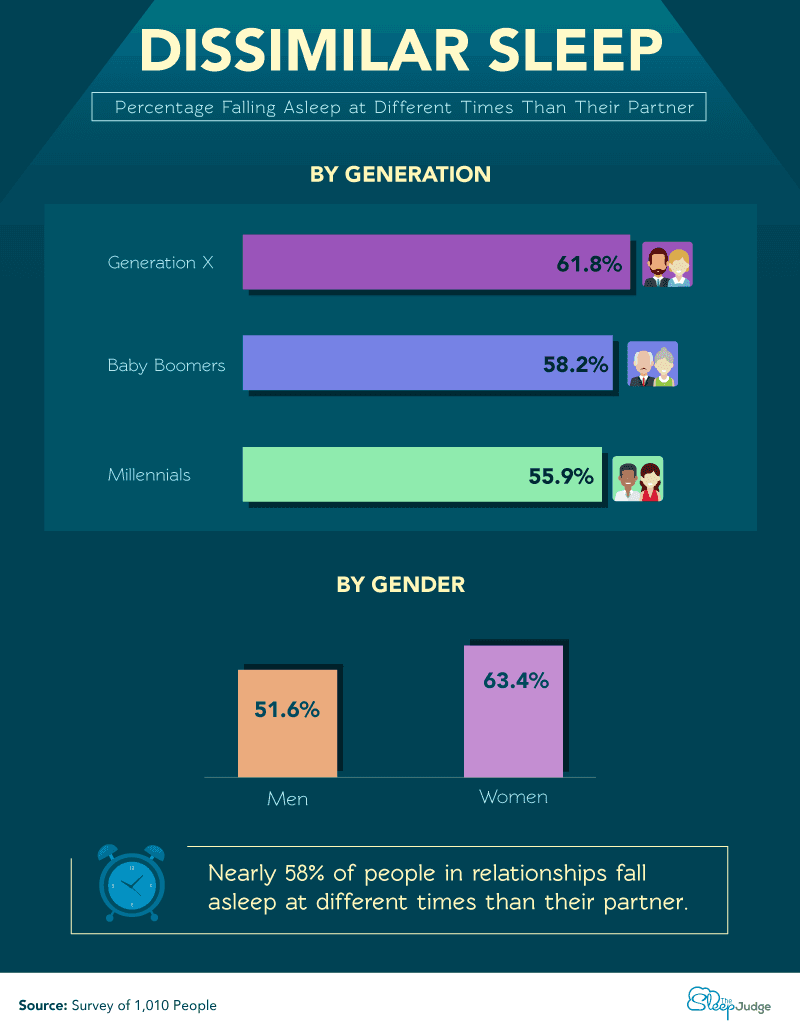It’s customary in most cultures to share a bed with your sweetheart, but it may be seriously harming your sleep quality - especially if you have a different sleep schedule than your partner.
According to a recent report, nearly one-third of adults say that they regularly get a poor night’s sleep. One of the common causes? Sleeping partner disturbances.
2020 research supports these claims, proving that more than half of all Americans lose sleep because of their partner’s snoring.
Moreover, 41 percent of Americans say that they lose sleep due to their partner’s differing sleep schedule.
To make matters worse, a lack of quality sleep is often linked to relationship problems.
Out of Sync Sleep, Out of Sync Relationship?
The majority of U.S. adults share a sleeping space with a significant other.
However, if you’ve ever shared a bed with someone in the long term, you know it’s not all it’s cracked up to be at times.
Whether your sleeping partner’s electronics and body movements keep you up at night or your sleeping partner becomes a snoring partner, sleep deprivation caused by different sleep habits is real.

Not only is sleep deprivation unhealthy for our bodies and minds, but it’s also unhealthy for our relationships. Lack of quality sleep is linked to an increase in arguments among couples.
We’re likely to be grouchier after a poor night’s rest, and that reflects in how we interact with the people in our lives.
Moreover, different sleep schedules and preferences may lead to resentment over time.
If you’re an early bird but your partner is a night owl, you may experience a growing lack of quality time together due to different schedules.
That said, most of us go to bed at different times than our partners. A study by The Sleep Judge found that nearly 58 percent of people admit to falling asleep at a different time than their partner.
If you’re wondering why our bedtimes seem to vary from one another so much, a couple of variables may be at play.
While some people report that they may simply take longer to fall asleep, others cited different daily schedules or even disruptive bedtime electronic usage that keeps them awake.
Sleep is vital for our mental and physical well-being. Without enough of it, our relationships begin to suffer.
Changing your sleep from one solid chunk of rest to a biphasic or polyphasic sleep schedule may serve as a solution for some people.
Try Polyphasic Sleep
Did you know that sleep hasn’t always consisted of one solid block of rest? A monophasic sleep pattern is part of most of our routines, but it’s not the only option.
Historically, many people slept in two segments or more prior to the industrial revolution.
The first sleep consisted of 3 to 3.5 hours of rest between around 9 and 10 PM.
Then, many would wake around midnight to read or do a soothing activity, retiring for a second sleep after an hour or so until the sun came up.
Sleeping for more than two separate chunks of time throughout the night refers to a polyphasic sleep schedule. Regardless of the number of different sleep segments, your total sleep duration should remain the same.
By adopting this type of sleep regimen, you and your partner may be able to better sync your schedules for more quality time (and quality sleep) together.
Some biohackers even claim that biphasic or polyphasic sleep is a secret weapon for increased energy and productivity.
If a unique sleep pattern isn’t in the cards for you, sleeping separately may be the key to restoring your healthy rest habits.
Consider a “Sleep Divorce”
Sleeping separately from your partner may sound frightening, but some couples with differing sleep schedules and habits swear by it.
When it comes down to it, sleep is one of the most essential activities for maintaining our mental and physical health.
Separate sleeping quarters help you achieve quality rest without disturbances, which may help you both remain in good spirits during waking hours.

When we’re short on sleep, we’re more irritable, grouchy, impulsive, and moody. Therefore, sometimes achieving quality sleep at any cost necessary is worth it.
A snoring partner leads to sleep deprivation, but so do different sleeping preferences. For example, some people may have different temperature, noise, or even mattress preferences.
Therefore, if your preferences simply don’t match, sleeping in separate rooms for a short or extended period of time ensures that you’ll be able to get the rest you need to be at your best in the morning.
However, many couples may be reluctant to sleep in separate beds.
Sleeping with your partner stimulates the production and release of oxytocin, a hormone that functions as a neurotransmitter.
This hormone, often called the “love hormone” is thought to be a driving force behind attraction within relationships.
Oxytocin is also thought to lower anxiety, regulate blood pressure, and boost feelings of empathy and happiness.
If you want to stick with your sleeping partner and aren’t ready for a sleep divorce, the “Scandinavian Sleep Method” serves as a happy compromise that still allows you to reap the relationship-boosting benefits of oxytocin.
Test Out The Scandinavian Sleep Method
Much like we’re expected to have a monophasic sleep schedule and sleep in the same bed with our partner, we’re also expected to share one single blanket.
Research has revealed that sharing a comforter leads to a 30 percent increase in interrupted sleep.
The “Scandinavian Sleep Method” is common in certain parts of the world, including Sweden, Norway, Denmark, and certain areas of Europe. The technique is simple: rather than sharing one single blanket with your partner, you each have your own separate blanket.
@somnifix Partner always stealing the covers? It’s proven to disrupt our sleep. Rather than sleeping in separate beds, try the Scandinavian Sleep Method! #learntok #scandinaviansleepmethod #sleephack #didyouknow #cantsleep #greenscreenvideo #greenscreen ♬ Boy's a liar Pt. 2 - PinkPantheress & Ice Spice
Rather than playing tug-of-war over one blanket and experiencing sleep disturbances, you won’t wake up because of the blanket thief you share a bed with.
Moreover, you can adjust your sleeping position without worrying about interrupting your partner’s sleep.
This solution offers some physical control over your own sleeping preferences without affecting your partner - all without sacrificing the intimacy or closeness of sharing a bed.
While this method addresses most physical sleep disturbances, it doesn’t prevent your snoring partner from causing sleep deprivation due to the sound of their snoring.
As you introduce separate comforters, address snoring for good to experience your best sleep yet. Believe it or not, you can learn how to stop someone from snoring without waking them by preventing snoring before they ever fall asleep.
Stop the Snore
Sleeping with a snoring partner means sleep deprivation and restless nights.
You may wake up tired because you can’t fall or stay asleep due to the sound of your sleeping partner sawing logs.
In fact, spouses of snorers woke up an average of 21 times per hour when compared to spouses of non-snorers, according to the Mayo Clinic. These disruptions add up, leading to sleep debt.

And if you’re the snorer, your sleep is often affected due to poor oxygenation - even if you aren’t waking up several times throughout the night due to the noise.
That said, you may be jolted awake because your sleeping partner is elbowing you in the back or kicking your leg to try and silence the sound of your snoring.
Resentment may build unless you both try to find a solution. Furthermore, if left untreated, snoring may lead to sleep disorders like sleep apnea.
Luckily, you can learn how to stop someone from snoring without waking them by taking some precautions during waking hours. The first step to blocking out snoring is to understand how and why it happens.
While a sleep study may be necessary to determine the specific cause of your snoring, mouth breathing during sleep is a common culprit.
Mouth breathing during sleep causes the airway tissues to fall backward and vibrate together, producing the sound of snoring.
Aside from creating an irritating sound, snoring and mouth breathing lead to poor oxygenation, bad breath, cavities, and even neck and back pain.
Nasal breathing, on the other hand, prevents snoring and promotes quality sleep by enhancing oxygenation.
If you want to learn how to stop someone from snoring without waking them, they have to keep their mouth shut!
Shut Your Mouth (Literally)
Around 61 percent of us identify as chronic, habitual mouth breathers.
If mouth breathing causes over-breathing, poor oxygenation, and snoring, why do so many of us do it?
In short, our soft, over-processed modern diet may have something to do with it. Over time, our jaw strength and skull shapes have weakened, leading to a more narrow palate.
With a narrow palate and weak jaw and airway muscles, we can’t maintain a proper tongue posture and lip seal, leading to mouth breathing.
Luckily, we can train ourselves to make the switch from mouth breathing to nasal breathing over time.
That said, preventing mouth breathing and snoring during sleep may require additional intervention. If you want to learn how to stop someone from snoring without waking them, the key is to prevent snoring and mouth breathing in the first place.
To stop snoring in its tracks during sleep, mouth tape is essential.

While it sounds strange, mouth tape is a proven solution to preventing mouth breathing at night by forcing a proper lip seal and tongue posture.
Before you slap on any tape you have on hand, be warned that the adhesives in most tapes contain chemicals that lead to rashes and irritation.
SomniFix, however, was designed as a safe option for even the most sensitive skin. Our strips include a hypoallergenic, gel-like adhesive free from gluten and latex.
Our strips also include a patented central breathing vent if you’re nervous about becoming congested overnight.
Easing the tension between you and your snoring partner at night is as easy as shutting your mouth…with the help of SomniFix, that is!







